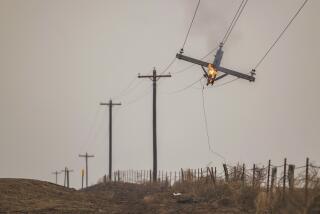SCIENCE FILE : Earthwatch: A Diary of the Planet
- Share via
Global Warming
Some of the most popular vacation spots in the world could be facing a decline in business due to global warming, according to a report by the World Wildlife Fund. Temperatures could rise to uncomfortable levels at seaside resorts and could bring about abbreviated ski seasons on low-lying slopes. The report said tourist destinations along the Mediterranean coast will experience an increasing number of days with temperatures in excess of 104 degrees. Faster melt during the winter ski season could mean more crowded conditions on the slopes due to fewer days in which to ski. Ute Collier, a World Wildlife Fund expert on climate change, also warned about an increased possibility of flooding, drought, forest fires, rising ocean levels and resulting diseases such as malaria, which could turn “profitable destinations into holiday horror stories.”
Tropical Storms
Hurricane Dennis drenched parts of the Bahamas with more than 10 inches of rainfall before moving slowly and weakening off the Carolina coast. Extensive beach erosion occurred due to the length of time the storm remained offshore. The high surf generated by Dennis also washed away scores of nests of the environmentally threatened loggerhead sea turtle in what was to have been one of the best nesting seasons on record.
Hurricane Cindy lost force over the open waters of the Atlantic Ocean after killing scores of people during its development phase in western Africa.
Earthquakes
Terrified survivors of Turkey’s Aug. 17 temblor once again were sent fleeing into the streets by a magnitude 5.2 quake, which was followed 20 minutes later by a magnitude 4.6 tremor. One person was killed and at least 166 were injured when the city of Izmit was shaken by the stronger quake. Many buildings damaged during the magnitude 7.4 quake in August crumbled from the additional shaking.
Earth movements were also felt in western Greece’s Ionian Sea region, New Zealand’s North Island, the northern Philippines and in south-central Alaska.
Wildfires
Nearly 2,000 brush fires were raging out of control across the central-western region of Brazil. More than half of a 10,000-acre rain forest sanctuary in the central part of the country has already been destroyed, and many more rare plant and animal species are threatened by the advancing blazes. The fires were fueled by an ongoing drought and fanned by hot, gusty winds.
Wildfires continued to rage across several western U.S. states. California firefighters began burning selected forests in an effort to prevent the largest of the state’s wildfires from advancing to the resort towns of the San Bernardino Mountains.
Distributed by: The Los Angeles Times Syndicate E-mail: earth@slip.net
More to Read
Sign up for Essential California
The most important California stories and recommendations in your inbox every morning.
You may occasionally receive promotional content from the Los Angeles Times.













